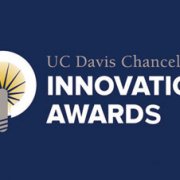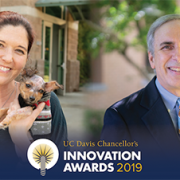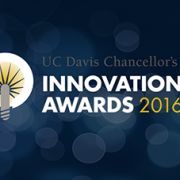UC Davis Innovators Honored for Contributions in Agriculture, Pathology
/in News /by Aj Cheline
The University of California, Davis, tonight (May 15) announced the recipients of the university’s 2018 Chancellor’s Innovation Awards at a ceremony on campus. Established in 2016, the awards recognize faculty, community partners and industry leaders for their work, dedication and success in improving the lives of others and addressing the needs of our global society either through innovations in technology or innovative societal engagement.
“These honorees reflect the growing importance of UC Davis as an incubator and promoter of innovation, not just in the Sacramento region, but in the world,” said Provost Ralph J. Hexter. “They are groundbreakers in finding new ways to feed the world, build community and develop technology that creates a better tomorrow for all.”
The university’s Venture Catalyst team manages the Chancellor’s Innovation Awards as part of its broader mission to enable innovative students, faculty and staff to engage effectively with the innovation community both within and outside the university. “Recognizing our campus innovators and celebrating how their research and innovative university activities positively impact society is one of the ways in which we are supporting a culture of innovation and entrepreneurship at UC Davis,” said Dushyant Pathak, associate vice chancellor of research and the executive director of Venture Catalyst within the UC Davis Office of Research.
Innovators of the Year
These awards recognize individual faculty, staff or teams whose innovative research or accomplishments have made a measurable societal impact in the preceding year, or whose university activities have achieved important milestones, and present very strong potential for societal impact. Recipients receive $10,000 that can be applied to their research or to university enabled societal engagement efforts. This year’s recipients are the DryCard team from the Horticulture Innovation Lab and Richard Levenson, professor and vice chair for strategic technologies in the Department of Pathology and Laboratory Medicine.
DryCard team
The DryCard team from the Feed the Future Innovation Lab for Horticulture in the UC Davis College of Agricultural and Environmental Sciences was selected for its simple, low-cost invention that helps prevent food spoilage. The reusable DryCard™ is about the size of a business card and uses a strip of cobalt chloride paper that changes color based on humidity. Instructions (available in multiple languages) are printed directly on the card. With a DryCard and an airtight container, farmers can test samples of their crops for dryness in 20 to 30 minutes. Crops that are stored before being sufficiently dry are susceptible to molds and dangerous aflatoxins. Mold growth on dried foods is a pervasive problem in developing countries, leading to food waste and foods that are unsafe for consumption.
Video: A inexpensive innovation to prevent food waste
The DryCard team from the Feed the Future Innovation Lab for Horticulture in the UC Davis College of Agricultural and Environmental Sciences was selected for its simple, low-cost invention that helps prevent food spoilage. The reusable DryCard™ is about the size of a business card and uses a strip of cobalt chloride paper that changes color based on humidity. Instructions (available in multiple languages) are printed directly on the card. With a DryCard and an airtight container, farmers can test samples of their crops for dryness in 20 to 30 minutes. Crops that are stored before being sufficiently dry are susceptible to molds and dangerous aflatoxins. Mold growth on dried foods is a pervasive problem in developing countries, leading to food waste and foods that are unsafe for consumption.
The DryCard team includes: Elizabeth Mitcham, director; James Thompson, postharvest specialist emeritus; Michael Reid, leader for innovation and technology; Angelos Deltsidis, international postharvest specialist; Archie Jarman, program officer; Anthony Phan, staff analyst; and Brenda Dawson, communications coordinator.
The idea for the card came from Reid and Thompson, who have a history of working together in California and around the world on postharvest technologies to reduce crop losses. Last year the card was named as the top emerging technology for reducing food loss and waste across the African continent at the All-Africa Postharvest Congress and Exhibition in Kenya. Through the Horticulture Innovation Lab, the team has collaborated with a network of independent businesses in Africa and Asia that have manufactured and distributed more than 10,000 DryCards. Helping local entrepreneurs manufacture the cards inexpensively but for profit is the team’s strategy for helping spread the product throughout the developing world.
The Horticulture Innovation Lab is funded by the U.S. Agency for International Development, as part of the U.S. government’s global hunger and food security initiative called Feed the Future.
Richard Levenson
Levenson, professor and vice chair for strategic technologies in the Department of Pathology and Laboratory Medicine at the UC Davis School of Medicine, has been selected Innovator of the Year for the development of Microscopy with Ultraviolet Surface Excitation, or MUSE, to obtain high-resolution images of biological tissue specimens without first requiring the time-consuming preparation of thin sections mounted on glass slides.
Video: Richard Levenson on MUSE microscopy
The technology, based on intellectual property jointly developed at Lawrence Livermore National Lab and UC Davis, uses ultraviolet light to penetrate the surface of tissue samples to a depth of a few microns, about the same thickness of tissue slices on traditional microscope slides. The result is a detailed, diagnostic-quality image in minutes instead of the many hours that traditional methods require. MUSE has the potential to transform the practice of pathology, especially in low-resource settings, and to have a major global impact in health care by greatly reducing the cost and time to deliver definitive diagnostic results. The ability to obtain such nearly instant, high-resolution, full-color images can also be a valuable tool for researchers who want to get tissue-based insights at the laboratory bench. Levenson is the co-founder of MUSE Microscopy Inc., which is working to commercialize the technology.
Lifetime Achievement Award for Innovation
Gurdev Khush, a world-renowned plant geneticist, is the recipient of the Lifetime Achievement Award for Innovation for his truly extraordinary leadership in developing rice strains that have enhanced the quality and quantity of global rice supplies. The award recognizes an acknowledged innovator whose career accomplishments include innovations that have led to a long-term positive impact on the lives of others and who is an inspiring influence for other innovators.
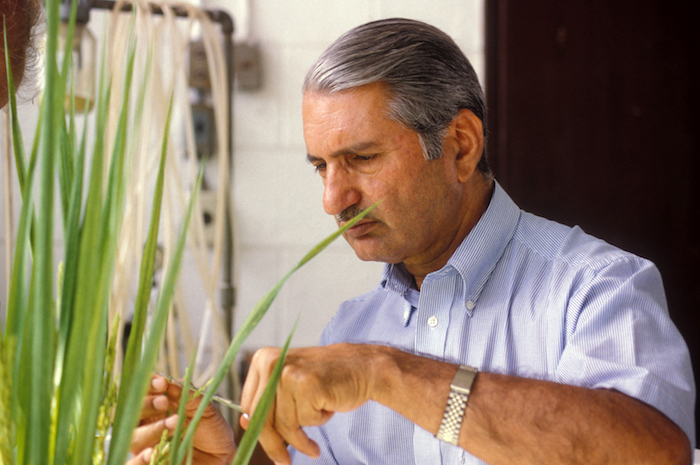
Gurdev Khush, a world-renowned plant geneticist, is the recipient of the Lifetime Achievement Award for Innovation. (Credit: International Rice Research Institute)
Khush is known one of the heroes of the Green Revolution, a movement that sought to significantly increase agricultural yields, particularly in developing countries.
Khush earned a B.Sc. from Punjab Agricultural University in India and a Ph.D. from UC Davis. He played a key role in the development of more than 300 innovative rice varieties. One of these, IR36, is the most widely planted food crop ever grown. He spent over 30 years at the International Rice Research Institute, or IRRI, directing and participating in both genetic research and the delivery of rice varieties to underserved populations around the globe.
Owing in large part to Khush’s contribution, world rice production increased from 257 million tons in 1966 to 718 million tons in 2011. Khush has won numerous international awards and has received honorary doctorates and degrees from multiple universities. After he retired from IRRI in 2002, Khush returned to UC Davis as an adjunct professor of plant sciences. Khush is also the recipient of the 2018 UC Davis Medal, given to those who have made exceptional and sustained contributions to the UC Davis community and beyond.
Innovative Community Partner Award
Seed Central is the recipient of the UC Davis Chancellor’s Innovative Community Partner of the Year Award, given in recognition of significant contributions to driving regional economic impact through innovation, entrepreneurship or support for growing the startup ecosystem in collaboration with university.
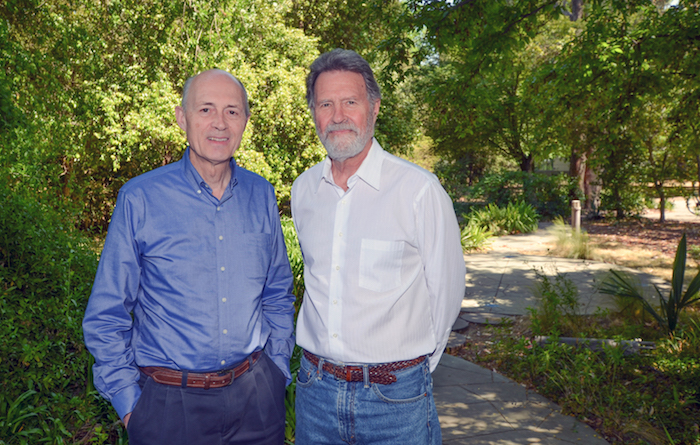
Francois Korn, managing director of Seed Central, and Kent Bradford, distinguished professor of plant sciences and director of the Seed Biotechnology Center at UC Davis. Seed Central is the recipient of the UC Davis Chancellor’s Innovative Community Partner of the Year Award. (Credit: AJ Cheline, UC Davis)
Seed Central energizes the seed and ag-biotech industry around UC Davis and contributes to economic development in the region. The public-private partnership was co-founded in 2010 by Francois Korn, managing director, and Kent Bradford, distinguished professor of plant sciences and director of the Seed Biotechnology Center at UC Davis. The innovative partnership facilitates communication and research collaboration between campus and industry in order to bring science to market faster. Seed Central connects campus scientists and students with industry researchers and managers at monthly networking events and encourages and helps industry sponsor research on campus. Seed Central also connects students with industry through frequent networking opportunities, field trips, shadowing experiences, internships, career development workshops and special events centered on outreach to women in STEM fields.
Media contact(s)
AJ Cheline, UC Davis Office of Research, 530-752-1101, [email protected]
2018 Chancellor’s Innovation Awards Nominees
Ramsey Badawi, Associate Professor, Biomedical Engineering, College of Engineering; Simon Cherry, Distinguished Professor, Biomedical Engineering, College of Engineering
The world’s first total-body Positron Emission Tomography (PET) scanner.
John Boone, Professor, Biomedical Engineering, College of Engineering
Breast CT system that is capable of generating 300 to 500 tomographic slices of the breast using the same radiation levels as two view mammography.
Robert Brosnan, Professor of Surgical and Radiological Sciences, School of Veterinary Medicine
Discovery and development of a new inhaled general anesthetics, which led to the discovery of a novel analgesic.
Gino Cortopassi, Professor, Molecular Biosciences, School of Veterinary Medicine
Advanced the understanding of mitochondrial disorders, neuro-degeneration in humans and animals, as well as an understanding of diabetes and metabolic disorders.
Paul Feldstein, President and CEO at Circularis Biotech
Unique ribozyme design that is capable of discovering all active promoters in an organisms’ genome so that they can be analyzed and then evolved for enhanced performance.
Allen Gao, Ralph de Vere White Professor, Urology, School of Medicine
Prostate cancer therapies with special focus on cases of intractable cancers that become resistant to standard treatments.
Bruce Hammock, Distinguished Professor, Entomology and Nematology, College of Agricultural and Environmental Sciences
Inhibitors of the sEH enzyme which degrades natural mediators, thereby reducing hypertension, inflammation, and pain.
David Horsley, Professor, Mechanical and Aerospace Engineering, College of Engineering
Miniature sonar sensor by combining microelectromechanical systems (MEMS) ultrasound transducers and ultralow-power integrated circuits in a tiny, millimeter-scale package.
Tina Jeoh, Associate Professor, Biological and Agricultural Engineering; Herbert Scher, Research Engineer; Scott Strobel, Ph.D. Candidate; Yuting Tang, Ph.D. Student; College of Engineering.
An inexpensive and effective method for encapsulation of chemicals or biologics in stable, identifiable capsules that enhance the stability and control the release of their encapsulants.
Austin Johnson, Assistant Professor, Emergency Medicine; School of Medicine; Jason Adams, Assistant Professor, Pulmonary and Critical Care Medicine; School of Medicine
VentRight uses advanced sensors and waveform analytics to optimize ventilation for patients with acute respiratory failure. Endovascular Perfusion Augmentation for Critical Care (EPACC) represents a device that optimizes blood pressure management during shock using automated dynamic control of an intra-aortic balloon-tipped catheter.
Samuel Louie, Professor of Internal Medicine, School of Medicine
The ROAD (Reversible Obstructive Airways Disease) Project addresses healthcare disparities and unmet needs in patient education and safety for the COPD population captured by UC Davis Health.
Mark Mascal, Professor, Chemistry, College of Letters and Sciences
Processing waste biomass to produce plastics and bio-based fuels.
Prasant Mohapatra, Professor, Computer Science, College of Engineering
Computer networks with specializations in Wireless Networks, Mobile Communications and Systems, Cybersecurity, Wireless Performance, Quality and Security, and Network Analytics.
Jan Nolta, Professor, Institute for Regenerative Cures, School of Medicine
Cellular response to hypoxia and chemokines, cell motility, cell-to-cell interactions, and paracrine factors secreted by MSCs at the site of injury.
Hooman Rashidi, Associate Professor, Pathology and Laboratory Medicine, School of Medicine
An advanced app focused on hematology assessment.
Michael Rogawski, Professor, Neurology and Pharmacology, School of Medicine
The first bench-to-beside translation for a therapeutic in postpartum depression.
Michael Siminovitch, Director, California Lighting Technology Center (CLTC)
Shifting of the paradigm in lighting and technology science from a sole focus on energy efficiency to a more complex understanding of the interplay among energy efficiency and quality, human health and well-being, and aesthetics.
Neelima Sinha, Professor, Plant Biology, College of Agricultural and Environmental Sciences; Brad Townsley, CEO & Co-Founder of Amaryllis Nucleics; Mike Covington, CTO & Co-Founder of Amaryllis Nucleics
Technology for synthesizing, sequencing, and analyzing RNA-sequencing (RNA-seq) libraries.
Gang Sun, Professor, Materials Science and Engineering, College of Engineering
Sensitive, wearable, disposable, color changing sensor, to rapidly detect the presence of fumigants.
Garen Wintemute, Attending Physician, Emergency Department, School of Medicine
Firearm safety and gun violence prevention research.

